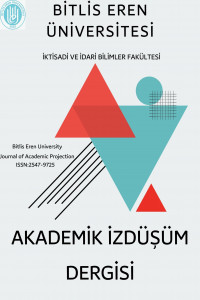The Anti-Religious Campaign of Soviet Authoroties In The Mono-City of Kazakhstan
This article concerns the main direction of the anti-religious campaign of Soviet authorities in Kazakhstan on the example of Kentau multicultural mono-city. The subject of the study is the policy and practice of local authorities to fulfill the tasks of the anti-religious campaign, the response of believers, the forms of their protection and resistance, the results of the anti-religious campaign in the mono-city. The article analyzes the religious life of Kentau mono-city, built in the second half of the 20th century as a "new city", free from the vices of capitalist society, including religion. When creating new cities, their key feature and main advantage, according to the ideologists of the Soviet authorities, was the lack of historical memory, the past in any of its manifestations, including, in the religious ones. This feature was to contribute to a more active formation in the mono-city of a new life and a new type of man - a Soviet man. The author comes to the conclusion that, despite anti-religious measures on the part of the Soviet authorities and the declaration of the idea "Kentau is a mono-city without mosques and churches," the population continued to perform religious activities, and the spectrum of confessions in the city was wide enough.
Anahtar Kelimeler:
Anti-religious campaign, Kentau mono-city, Communist ideology, Everyday life, Soviet authorities.
___
- Abdikhanov, A Confessions of Southern Kazakhstan at the end of the XIX - 80s of the XX century: historical analysis, Doctoral Thesis. West Kazakhstan University named after Utemisov, Uralsk, 2010.
- Abdrakhmanova, K. The everyday life of the cities of Central Kazakhstan in 1945-1953, Doctoral Thesis, Karaganda State University, Karaganda, 2009.
- Atabekova, R. Kentau: alpys zhyl-alpys beles, Oner, Almaty, 2015.
- Archive of the President of the Republic of Kazakhstan, F.708, Op.31, D.169.
- Archive of the President of the Republic of Kazakhstan, F.708, Op.33, D.1508.
- Archive of the President of the Republic of Kazakhstan, F.708, Op.57, D.1421.
- Archive of the President of the Republic of Kazakhstan, F.708, Op.65, D.1293.
- Auanasova, B. History of the evolution of religious relations in Kazakhstan in 1917-1991. Doctoral Thesis. West Kazakhstan University named after Utemisov, Uralsk, 2007.
- Brodel, F The structures of everyday life: the possible and the impossible, L. Kubel (ed.). Progress, Moscow, 1986.Kentau regional state archive, F.57, Op1, D.489.
- Koigeldiev, M. The phenomenon of labor in the Soviet society, Karatau, Almaty, 2016.
- Maulenkulov, S. Working prowess of Achisay, Erkin and K-XXI, Kentau, 2010.
- Mukhtarova, G. Islam in Soviet Kazakhstan in 1917-1991, Doctoral Thesis, West Kazakhstan University named after Utemisov, Uralsk, 2007.
- Nurlanova, N. The main problems of socio-economic development of mono-cities in Kazakhstan, Scientific Heritage, Almaty, 2012.
- Sadykovа, A. The policy of the Soviet authorities in the sphere of religion (1918-1953), Doctoral Thesis, Kazakh National University named after Al-Farabi, Almaty, 2015.
- ISSN: 2547-9725
- Yayın Aralığı: Yılda 2 Sayı
- Başlangıç: 2016
- Yayıncı: Bitlis Eren Üniversitesi
Sayıdaki Diğer Makaleler
Uluslararası Çalışma Örgütünün(UÇÖ-ILO) Yüzüncü Yıl Dönümü ve Türkiye İlişkileri
Jeopolitik Kontrolden Biyopolitik Kontrole
Siyasi Savaş ve Güvenlik Açığı
Sürdürülebilir İşletme Olma Yolunda Çözüm Önerileri
The Anti-Religious Campaign of Soviet Authoroties In The Mono-City of Kazakhstan
Yerzhan PAZILOV, Gulzhan OTARBAYEVA
An Evalation With Regarding to Turkish Wealth Fund: Aims Activities and Legal Status
